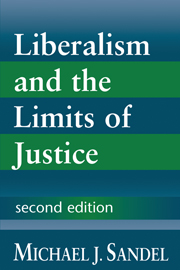Book contents
- Frontmatter
- Contents
- Preface to the Second Edition: The Limits of Communitarianism
- Acknowledgments
- Introduction: Liberalism and the Primacy of Justice
- 1 Justice and the Moral Subject
- 2 Possession, Desert, and Distributive Justice
- 3 Contract Theory and Justification
- 4 Justice and the Good
- Conclusion: Liberalism and the Limits of Justice
- A Response to Rawls' Political Liberalism
- Bibliography
- Index
3 - Contract Theory and Justification
Published online by Cambridge University Press: 05 June 2012
- Frontmatter
- Contents
- Preface to the Second Edition: The Limits of Communitarianism
- Acknowledgments
- Introduction: Liberalism and the Primacy of Justice
- 1 Justice and the Moral Subject
- 2 Possession, Desert, and Distributive Justice
- 3 Contract Theory and Justification
- 4 Justice and the Good
- Conclusion: Liberalism and the Limits of Justice
- A Response to Rawls' Political Liberalism
- Bibliography
- Index
Summary
In assessing the validity of the difference principle, we are led ultimately to the question of justification, and in particular to the question why the original position provides an appropriate way of thinking about justice at all. Even assuming, for the sake of argument, that the parties to the original position really would choose the principles Rawls says they would, why does this give us reason to believe that these principles are just? Rawls writes that the principles of justice are those principles ‘that free and rational persons concerned to further their own interests would accept in an initial position of equality’ (11), and that the original position is ‘the appropriate initial status quo which insures that the fundamental agreements reached in it are fair’ (17). ‘Understood in this way the question of justification is settled by working out a problem of deliberation: we have to ascertain which principles it would be rational to adopt given the contractual situation. This connects the theory of justice with the theory of rational choice’ (17).
But it is not immediately clear how the original position confers moral status on the results of an exercise in rational choice, not obvious what the justificatory force of the argument from the original position consists in. The question of justification is complicated by the fact that Rawls seems simultaneously to rely on two different sorts of justification, one appealing to the method of reflective equilibrium, the other to the tradition of the social contract, and sorting out their respective roles poses certain difficulties (Lyons, Reading Rawls: 141–68).
- Type
- Chapter
- Information
- Liberalism and the Limits of Justice , pp. 104 - 132Publisher: Cambridge University PressPrint publication year: 1998

